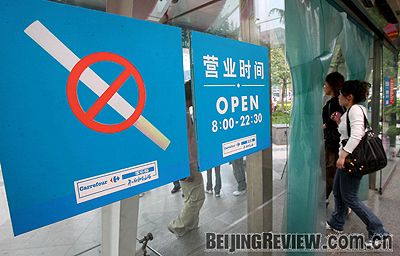|

AWARENESS: Anti-smoking signs may do more for curbing smoking than higher cigarette tax (LI MINGFANG) |
Blowing Smoke Rings
The Chinese Association of Tobacco Control recently proposed to raise the consumer tax on cigarettes by 16 folds to 1 yuan ($0.15) per pack.
China's tobacco control efforts seem to have taken a path different from that adopted by most countries. Instead of targeting tobacco producers, they always focus on smokers. Raising the consumer tax on cigarettes clearly shows that vested interests are being protected. Even if this move is successful, it is consumers who will bear the brunt of the costs, while tobacco companies come out smelling like roses.
While impractical proposals like this are supported, many effective and reasonable measures are ignored, such as printing horrific pictures about dangers of smoking on cigarette packs. Why does this happen? The former proposal targets consumers while the latter targets health authorities and tobacco companies.
A noticeable fact is that the government has too many economic interests in the tobacco industry. The State Tobacco Monopoly Administration and the China National Tobacco Corp. are actually the same agency. Besides, in major tobacco-growing provinces, this crop contributes 50 percent or more to local fiscal revenues. This may explain why China's tobacco control moves always end up in failure.
Modern Express
Pay Teachers Their Due
Starting from this January, China adopts a new payment system for teachers working in compulsory education, to ensure that these teachers are paid according to their performance, while their average pay will not be lower than that of civil servants.
However, it is sad to note that this regulation is nothing new. The Teachers' Law and the Compulsory Education Law all stipulate that teachers' salaries should not be less than civil servants' average level. It is obvious this law has not been strictly implemented until now.
How to ensure that teachers are not underpaid? Merit payments are obviously a good choice. But it's unlikely to help solve the fundamental problem. In the final analysis, the salary gap between teachers and civil servants is a result of unequal power.
Xiaoxiang Morning Herald
Housing Needs Free Market
Two local real estate companies in east China's Nanjing City were recently punished by the government for discount sales of their apartments. The reason given by relevant officials was that they sold houses at below market cost, meaning this practice constituted unfair competition.
In the market economy environment, property companies are free to set prices based on their analysis of the demand and the prospective rate of profit. Whether a price is reasonable or not can only be decided by sellers and buyers. No available financial data support the local government's argument that the two companies were punished because they were selling houses too cheaply.
Price and cost are both the result of market competition. If the government deprives a company of the right to establish prices, it is actually interfering with market competition.
China's property market is still immature, since some local governments are deeply involved in this industry. Thus, the excessively high housing prices in the past years should be partly blamed on the greed of these governments. The market mechanism will not stop working because of the government's interference. When demand in the housing market shrinks, the prices will fall.
Instead of directly interfering with pricing and market competition, the government may consider offering better financial and tax policies to revive the property market.
The Beijing News
Understanding Gov't. Jargon
The municipal government of east China's Hangzhou City recently decided that all of its meetings will believe broadcast via the Internet, so that people can gain a deeper insight into government affairs. This is a good decision, but it is still far from enough.
A major concern among the public is: Will viewers understand what officials are talking about when a meeting is live broadcast without explanation from reporters?
Not long ago, the draft of the new medical reform program was posted on the official website of the Ministry of Health and many other major websites, asking the public to give suggestions. However, most people said they could not understand what the program was about, let alone make comments.
In many cases, because of the jargon used, ordinary people do not know what officials are talking about. So even if there is a live broadcast of government meetings, it will do little to improve the public's understanding.
To ensure the public can know what the government is doing, apart from live broadcasts, policy documents must be easier to understand, so that people can actively contribute their ideas to government's decision-making process.
Yangzi Evening News | 